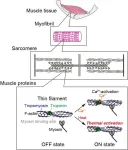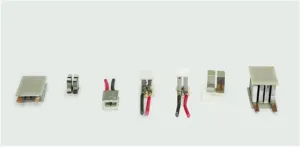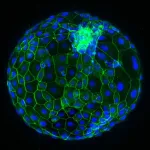(Press-News.org) Research has shown that music might be a drug-free way to lower humans’ pain perception. This decreased sensitivity to pain – also known as hypoalgesia – can occur when pain stimuli are disrupted between their point of input and where they are recognized as pain by the conscious mind. In a new study, researchers in Canada have examined what type of music helps to dampen pain perception.
“In our study, we show that favorite music chosen by study participants has a much larger effect on acute thermal pain reduction than unfamiliar relaxing music” said Darius Valevicius, a doctoral student at the Université de Montréal. The research was carried out at the Roy Pain Lab at McGill University and published in Frontiers in Pain Research. “We also found that emotional responses play a very strong role in predicting whether music will have an effect on pain.”
Everybody hurts (but less so when listening to favorite music)
To test which kind of music was most effective for reducing pain, participants received moderately painful thermal stimuli to the inner forearm, resulting in a sensation similar to a hot teacup being held against the skin. These stimuli were paired with music excerpts, each lasting approximately seven minutes.
Compared to control tracks or silence, listening to their favorite music strongly reduced pain intensity and unpleasantness in participants. Unfamiliar relaxing tracks did not have the same effect. “In addition, we used scrambled music, which mimics music in every way except its meaningful structure, and can therefore conclude that it is probably not just distraction or the presence of a sound stimulus that is causing the hypoalgesia,” Valevicius explained.
The researchers also examined if musical themes could modulate the pain-decreasing effects of favorite music. To do that, they interviewed participants about their emotional responses to their favorite music and assigned themes: energizing/activating, happy/cheerful, calming/relaxing, and moving/bittersweet. They discovered that different emotional themes differed in their ability to reduce pain.
“We found that reports of moving or bittersweet emotional experiences seem to result in lower ratings of pain unpleasantness, which was driven by more intense enjoyment of the music and more musical chills,” Valevicius said. Although it is not yet entirely understood what musical chills are, they seem to indicate a neurophysiological process that is effective at blocking pain signals. In some people, chills can manifest as a tingling sensation, shivers, or goosebumps.
Something for the pain
The researchers also pointed to limitations of their study, one of which is concerned with how long participants listen to music samples. For example, listening to relaxing music for longer might have stronger effects than the shorter tracks the participants listened to in this study. Questions which also need to be addressed in further research include if listening to favorite music is also effective with other, non-thermal pain stimuli, such as mechanical stimulation or chronic pain, the researchers said.
“Especially when it comes to the emotion themes in favorite music like moving/bittersweet, we are exploring new dimensions of the psychology of music listening that have not been well-studied, especially in the context of pain relief. As a result, the data we have available is limited, although the preliminary results are fairly strong,” Valevicius concluded.
END
Our favorite bittersweet symphonies may help us deal better with physical pain
Researchers found that listening to our preferred music reduces pain intensity and unpleasantness, knowledge which could optimize music-based pain therapies
2023-10-25
ELSE PRESS RELEASES FROM THIS DATE:
New evidence explains how warming-up enhances muscle performance
2023-10-25
Osaka, Japan – Everybody knows the importance of warming up your muscles before a workout. But what is actually going on when we warm our muscles up, and are all muscles the same? You might be surprised to find out that the science behind this routine activity hasn’t always been clear.
Now, in a study recently published in the Journal of General Physiology, a multi-institutional research team, led by Osaka University, The Jikei University School of Medicine and National Institutes for Quantum Science and Technology, has revealed how heating affects the contraction of different muscles, and how this might benefit populations in need of improved ...
KERI's thermoelectric technology, key to space probes, attracting German attention
2023-10-25
Drs. SuDong Park, Byungki Ryu, and Jaywan Chung of the Korea Electrotechnology Research Institute (KERI) developed a new thermoelectric efficiency formalism and a high-efficiency multistage thermoelectric power generator module. This innovation can boost nuclear battery performance, crucial for space probes, and has attracted attention from the German Aerospace Research Institute.
A Radioisotope Thermoelectric Generator (RTG), known as a thermoelectric-based nuclear battery, is a dependable power ...
Undiagnosed: More than 7 million Americans unaware they have mild cognitive impairment
2023-10-25
By Katharine Gammon
For many people, forgetting your keys or struggling to plan tasks can seem like a normal part of the aging process. But those lapses can actually be symptoms of something more serious: mild cognitive impairment, or MCI, which could be an early sign of Alzheimer’s disease.
Unfortunately, most people who have MCI don’t know it, so they’re unable to take advantage of preventive measures or new treatments, such as a recently approved drug for Alzheimer’s disease, that ...
GigXR partners with NUS Medicine to deliver holographic clinical scenarios for gastroenterology training
2023-10-25
GigXR, Inc., a global provider of holographic healthcare training, announced today its partnership with the Yong Loo Lin School of Medicine, National University of Singapore (NUS Medicine), one of the world’s leading medical schools, to introduce a new gastrointestinal module for the award-winning HoloScenarios application. Created to better prepare medical and nursing students in diagnosing and treating acute gastrointestinal diseases, HoloScenarios: Gastrointestinal delivers evidence-based, robust clinical simulations that present hyperrealistic holographic simulated patients and medical equipment to be used in any physical learning environment, ...
Sylvester Comprehensive Cancer Center tipsheet for Oct. 2023
2023-10-25
Cancer Leadership
Sylvester Leader Named BioFlorida’s ‘Researcher of Year’
Stephen D. Nimer, MD, Sylvester Cancer director, has been named Researcher of the Year by BioFlorida, an association for the state’s life sciences industry. BioFlorida represents 8,600 companies and research organizations in biopharmaceuticals, medical technology, digital and health systems. It honored Nimer for his groundbreaking research in adult leukemia which has contributed to transforming patient care. For details, visit the InventUM blog.
Pioneering Sylvester Physician Elected to Neuro-Oncology Board
Macarena de la Fuente, ...
UC Riverside physicist awarded National Medal of Science
2023-10-25
RIVERSIDE, Calif. -- Physicist Barry C. Barish, a distinguished professor of physics and astronomy at UC Riverside, was awarded the National Medal of Science by President Joe Biden at a ceremony held at the White House today. Established in 1959 by the U.S. Congress, the National Medal of Science is the highest recognition the nation can bestow on scientists and engineers.
The President’s National Medal of Science is given to individuals “deserving of special recognition by reason of their outstanding contributions in biology, computer sciences, education sciences, engineering, geosciences, mathematical and physical sciences, and social, behavioral, and economic ...
Daily 20-25 mins of physical activity may offset death risk from prolonged sitting
2023-10-25
Clocking up just 20-25 minutes of physical activity every day may be enough to offset the heightened risk of death from a highly sedentary lifestyle, suggests research published online in the British Journal of Sports Medicine.
But higher daily tallies of physical activity are linked to a lower risk, irrespective of the amount of time spent seated every day, the findings show.
In developed nations, adults spend an average of 9 to 10 hours every day sitting down—mostly during working hours. And a highly sedentary lifestyle is associated with a heightened risk of death, explain the researchers.
Much of the ...
Extending annual screen for diabetic eye disease to 2 years for those at ‘low risk’ could risk treatment delays and/or sight loss
2023-10-25
Extending the annual screen by a year for people in England considered to be at low risk of diabetic eye disease (diabetic retinopathy) could risk critical treatment delays and/or sight loss, suggests a large, real world data study, published online in the British Journal of Ophthalmology.
Early treatment is vital to stave off blindness, say the researchers. A 2-yearly screen delayed hospital referral by 12 months among around half of those who developed serious diabetic eye disease, with those at either end of the age spectrum and of Black ethnicity most at risk, the findings indicate.
A review and update of ...
Tai Chi may curb Parkinson’s disease symptoms and complications for several years
2023-10-25
Tai Chi, the Chinese martial art that involves sequences of very slow controlled movements, may curb the symptoms and complications of Parkinson’s disease for several years, reveals research, published online in the Journal of Neurology Neurosurgery & Psychiatry.
Its practice was associated with slower disease progression and lower doses of required drugs over time, the findings show.
Parkinson’s disease is a debilitating and progressive neurodegenerative disorder, characterised by slowness of movement, resting tremor, and stiff and inflexible muscles.
It is the fastest growing neurological ...
Public support for extending the 14-day rule on human embryo research indicated by foundational dialogue project
2023-10-25
The findings of a foundational UK public dialogue on human embryo research are published today, Wednesday 25th October 2023, as part of the Wellcome-funded Human Developmental Biology Initiative (HDBI). The HDBI is an ambitious scientific endeavour to advance our understanding of human development. The dialogue project, which was co-funded by UKRI Sciencewise programme, engaged a diverse group of the public to consider how early human embryo research can be used to its fullest, the 14-day rule and the fast-paced field of stem cell-based embryo models.
Headline findings include:
Appetite for review of the 14-day rule: Participants recognised that extending the 14-day rule could open ...
LAST 30 PRESS RELEASES:
Political polarization can spur CO2 emissions, stymie climate action
Researchers develop new strategy for improving inverted perovskite solar cells
Yes! The role of YAP and CTGF as potential therapeutic targets for preventing severe liver disease
Pancreatic cancer may begin hiding from the immune system earlier than we thought
Robotic wing inspired by nature delivers leap in underwater stability
A clinical reveals that aniridia causes a progressive loss of corneal sensitivity
Fossil amber reveals the secret lives of Cretaceous ants
Predicting extreme rainfall through novel spatial modeling
The Lancet: First-ever in-utero stem cell therapy for fetal spina bifida repair is safe, study finds
Nanoplastics can interact with Salmonella to affect food safety, study shows
Eric Moore, M.D., elected to Mayo Clinic Board of Trustees
NYU named “research powerhouse” in new analysis
New polymer materials may offer breakthrough solution for hard-to-remove PFAS in water
Biochar can either curb or boost greenhouse gas emissions depending on soil conditions, new study finds
Nanobiochar emerges as a next generation solution for cleaner water, healthier soils, and resilient ecosystems
Study finds more parents saying ‘No’ to vitamin K, putting babies’ brains at risk
Scientists develop new gut health measure that tracks disease
Rice gene discovery could cut fertiliser use while protecting yields
Jumping ‘DNA parasites’ linked to early stages of tumour formation
Ultra-sensitive CAR T cells provide potential strategy to treat solid tumors
Early Neanderthal-Human interbreeding was strongly sex biased
North American bird declines are widespread and accelerating in agricultural hotspots
Researchers recommend strategies for improved genetic privacy legislation
How birds achieve sweet success
More sensitive cell therapy may be a HIT against solid cancers
Scientists map how aging reshapes cells across the entire mammalian body
Hotspots of accelerated bird decline linked to agricultural activity
How ancient attraction shaped the human genome
NJIT faculty named Senior Members of the National Academy of Inventors
App aids substance use recovery in vulnerable populations
[Press-News.org] Our favorite bittersweet symphonies may help us deal better with physical painResearchers found that listening to our preferred music reduces pain intensity and unpleasantness, knowledge which could optimize music-based pain therapies




